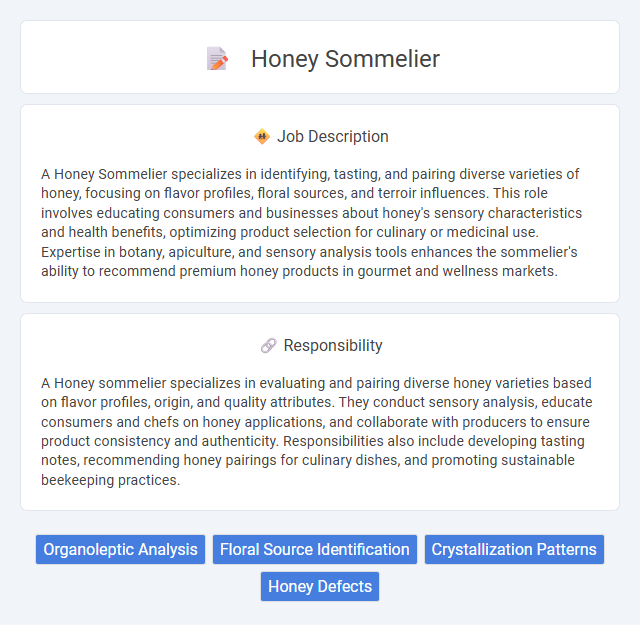
A Honey Sommelier specializes in identifying, tasting, and pairing diverse varieties of honey, focusing on flavor profiles, floral sources, and terroir influences. This role involves educating consumers and businesses about honey's sensory characteristics and health benefits, optimizing product selection for culinary or medicinal use. Expertise in botany, apiculture, and sensory analysis tools enhances the sommelier's ability to recommend premium honey products in gourmet and wellness markets.
Individuals with a keen sense of taste and smell will probably thrive as honey sommeliers, as the role demands acute sensory perception to evaluate honey varieties. Those who enjoy detailed analysis and have patience for methodical tasting processes could find this job well-suited to their skills. People prone to allergies to pollen or bee products might be less suitable due to constant exposure risks.
Qualification
A honey sommelier requires specialized knowledge of honey varieties, flavors, and origins, often gained through certified training programs and workshops. Proficiency in sensory evaluation, including taste profiling and aromatic identification, is essential for accurately categorizing and recommending honeys. Experience in apiology, food science, or a related field enhances a sommelier's ability to assess honey quality and pair it effectively with culinary applications.
Responsibility
A Honey sommelier specializes in evaluating and pairing diverse honey varieties based on flavor profiles, origin, and quality attributes. They conduct sensory analysis, educate consumers and chefs on honey applications, and collaborate with producers to ensure product consistency and authenticity. Responsibilities also include developing tasting notes, recommending honey pairings for culinary dishes, and promoting sustainable beekeeping practices.
Benefit
A honey sommelier likely enhances consumer experiences by expertly pairing various honey types with foods and beverages, increasing enjoyment and appreciation. Their specialized knowledge may help promote unique honey varieties, potentially boosting local economies and supporting sustainable beekeeping practices. Mastery in honey tasting and selection could also improve product quality and consumer satisfaction in culinary and retail settings.
Challenge
The honey sommelier job likely involves the challenge of mastering the vast diversity of honey varieties, each with unique flavors influenced by floral sources and regional conditions. Professionals must probably develop acute sensory skills to accurately identify subtle distinctions and provide informed recommendations. Navigating fluctuating market demands and ensuring sustainable sourcing could also present ongoing difficulties in this specialized field.
Career Advancement
A Honey Sommelier specializes in identifying, tasting, and pairing various honey varieties, driving expertise in product knowledge and sensory analysis. Career advancement opportunities include roles such as Honey Consultant, Quality Control Manager, or Product Development Specialist in food and beverage industries. Mastery in honey profiling combined with certifications can lead to leadership positions or entrepreneurial ventures in artisanal honey production and gourmet food sectors.
Key Terms
Organoleptic Analysis
A Honey sommelier specializes in the organoleptic analysis of honey, assessing its color, aroma, flavor, and texture to determine quality and origin. This professional leverages sensory evaluation techniques to identify floral sources, detect impurities, and recommend optimal pairings. Expertise in organoleptic properties supports quality control and enhances the consumer's tasting experience.
Floral Source Identification
A Honey Sommelier specializes in identifying floral sources by analyzing pollen content, aroma profiles, and nectar characteristics unique to each honey variety. Expert knowledge in botany and sensory evaluation enables accurate classification of monofloral and multifloral honeys, enhancing product authenticity and quality. This expertise supports beekeepers, retailers, and consumers seeking premium honey with distinct floral origins.
Crystallization Patterns
A Honey Sommelier analyzes crystallization patterns to determine the quality, floral source, and aging process of honey, aiding in precise flavor profiling. Understanding the microstructure of sugar crystals helps differentiate between raw and processed honey, impacting texture and palatability. Expertise in crystallization patterns guides optimal storage and serving recommendations, enhancing the consumer experience.
Honey Defects
A Honey Sommelier specializes in identifying and describing honey flavors, textures, and origins, with a crucial skill set in detecting honey defects such as fermentation, granulation, or off-flavors caused by overheating or contamination. Recognizing defects like overcrystallization, moisture imbalance, and adulteration helps maintain product quality and consumer trust. Expertise in sensory evaluation and chemical analysis ensures accurate defect identification, critical for quality control in honey production and retail.
 kuljobs.com
kuljobs.com